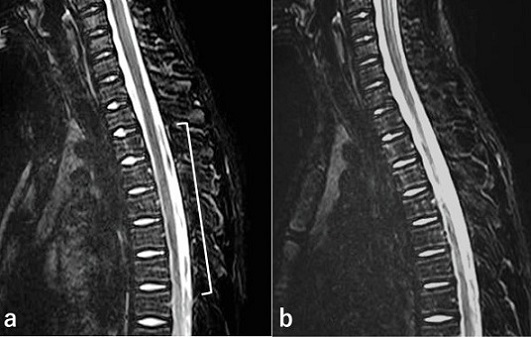BREAKING! Japanese Doctors Warn of Cerebrospinal Fluid Leakage Linked to COVID-19 in Children!
Nikhil Prasad Fact checked by:Thailand Medical News Team May 31, 2024 10 months, 2 weeks, 21 hours, 56 minutes ago
COVID-19 News: The COVID-19 pandemic, caused by the severe acute respiratory syndrome coronavirus 2 (SARS-CoV-2), has been marked by various neurological and psychiatric symptoms. These symptoms often persist long after the acute phase of the infection, leading to a condition known as long COVID or post-COVID-19. While much of the focus has been on adult patients, recent findings from Japan suggest that children are not spared from severe post-COVID-19 complications. Among these complications is cerebrospinal fluid leakage (CFL), a condition that can have debilitating consequences. This
COVID-19 News report is based on a documented case report submitted by doctors from Faculty of Medicine, Kagawa University-Japan and Department of Pediatrics, Kagawa Saiseikai Hospital-Japan
 Cerebrospinal Fluid Leakage Linked to COVID-19 in Children a.Fat-suppressed T2-weighted sagittal
Cerebrospinal Fluid Leakage Linked to COVID-19 in Children a.Fat-suppressed T2-weighted sagittal
spinal MRI shows the incomplete floating dural sac sign. b. The iFDSS improved on MRI before the child was discharged.
Neurological and Psychiatric Symptoms of COVID-19
COVID-19 has been associated with a myriad of neurological and psychiatric symptoms. Patients often report exercise intolerance, characterized by muscle weakness, fatigue, and pain. Cognitive impairments, popularly known as “brain fog,” alongside mood disorders, have also been frequently observed. In both adults and children, autonomic dysfunctions such as hypotension and hypothermia have been prevalent, with many being diagnosed with orthostatic dysregulation (OD). OD is often marked by symptoms like orthostatic headaches, dizziness, and nausea, which significantly impact the quality of life.
Case Study: A Child’s Struggle with CFL Post-COVID-19
-Initial Presentation
A notable case involves a 9-year-old boy who developed severe symptoms after recovering from COVID-19. Initially healthy with no underlying conditions or history of trauma, the boy experienced worsening dizziness, fatigue, nausea, and abdominal pain upon standing. Despite testing positive for COVID-19, his symptoms improved with intravenous fluid therapy, leading to his discharge after nine days. However, the boy's condition deteriorated, and he was readmitted with severe symptoms including abdominal pain, loss of appetite, significant dizziness, and orthostatic headaches.
-Diagnostic Challenges and Findings
Despite extensive testing, including blood tests, abdominal ultrasound, and head MRI, no abnormalities were found. Given the severity of his symptoms, particularly the orthostatic headaches and dizziness, a cerebrospinal fluid leak (CFL) was suspected. An MRI of the spine revealed an incomplete floating dural sac sign (iFDSS) in the thoracic and lumbar spine, indicative of a CSF leak.
-Treatment and Recovery
The patient&am
p;#39;s condition did not improve with initial treatments, prompting the administration of an epidural saline injection. This intervention significantly alleviated his symptoms, allowing him to sit upright and later walk with support. Follow-up MRI scans confirmed the improvement, and the patient was eventually discharged.
Understanding CFL and Its Connection to COVID-19
CFL is characterized by a reduction in cerebrospinal fluid, leading to various symptoms, most notably headaches. This condition can result from trauma or idiopathic causes, where the origin remains unknown. In the context of COVID-19, it is hypothesized that the virus may trigger immune responses that affect CSF absorption in the spinal cord, leading to CFL. This theory aligns with observed autonomic dysfunctions in post-COVID-19 patients.
Implications for Pediatric Long COVID
The case of the 9-year-old boy underscores the potential severity of long COVID in children. While long COVID symptoms are generally milder in children compared to adults, this case highlights the need for vigilance. Persistent symptoms such as headaches and fatigue, coupled with autonomic dysfunctions like OD, can significantly impact a child's well-being and development.
Diagnosing and Treating CFL in Post-COVID-19 Patients
Early diagnosis of CFL is crucial for effective treatment. Cisternography and magnetic resonance myelography are advanced imaging techniques that can confirm CFL. However, whole-spine T2-weighted MRI is a practical early diagnostic tool, especially in post-COVID-19 patients presenting with relevant symptoms.
Treatment Approaches
Treatment of CFL typically involves the administration of epidural blood patches, which have shown to improve prognosis. In the described case, an epidural saline injection was effective. Early intervention is key to managing symptoms and preventing long-term complications.
Conclusion
The emergence of cerebrospinal fluid leakage as a complication of long COVID in children is a concerning development. The case of the young boy from Japan illustrates the potential severity of this condition and highlights the importance of early diagnosis and treatment. As the medical community continues to unravel the complexities of post-COVID-19 symptoms, it is imperative to consider CFL in children presenting with severe autonomic dysfunctions. Prompt assessment and intervention can significantly improve outcomes and quality of life for affected children.
In summary, healthcare professionals should remain vigilant for signs of CFL in pediatric patients recovering from COVID-19, ensuring timely and appropriate care to mitigate the impact of this serious condition.
The study findings were published in the peer reviewed journal: Brain and Development Case Reports.
https://www.sciencedirect.com/science/article/pii/S2950221724000151
For the latest
COVID-19 News, keep on logging to Thailand Medical News.
Read Also:
https://www.thailandmedical.news/news/university-of-california-study-warns-that-even-mild-sars-cov-2-infections-will-result-in-abnormalities-in-cerebrospinal-fluid-and-also-cognitive-issue
https://www.thailandmedical.news/news/nice-neurologists-finds-replicable-sars-cov-2-rna-in-cerebrospinal-fluid-of-a-woman-114-days-after-she-was-diagnosed-with-asymptomatic-covid-19
https://www.thailandmedical.news/news/neurocovid-study-shows-that-covid-19-brain-fog-caused-by-inflammatory-molecules-in-the-cerebral-spinal-fluid
